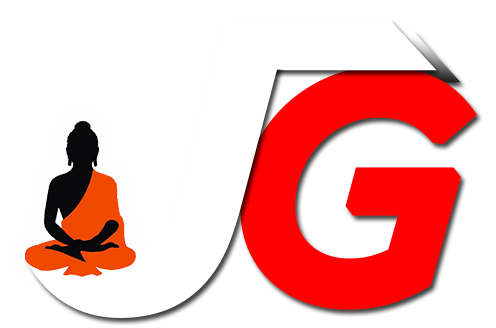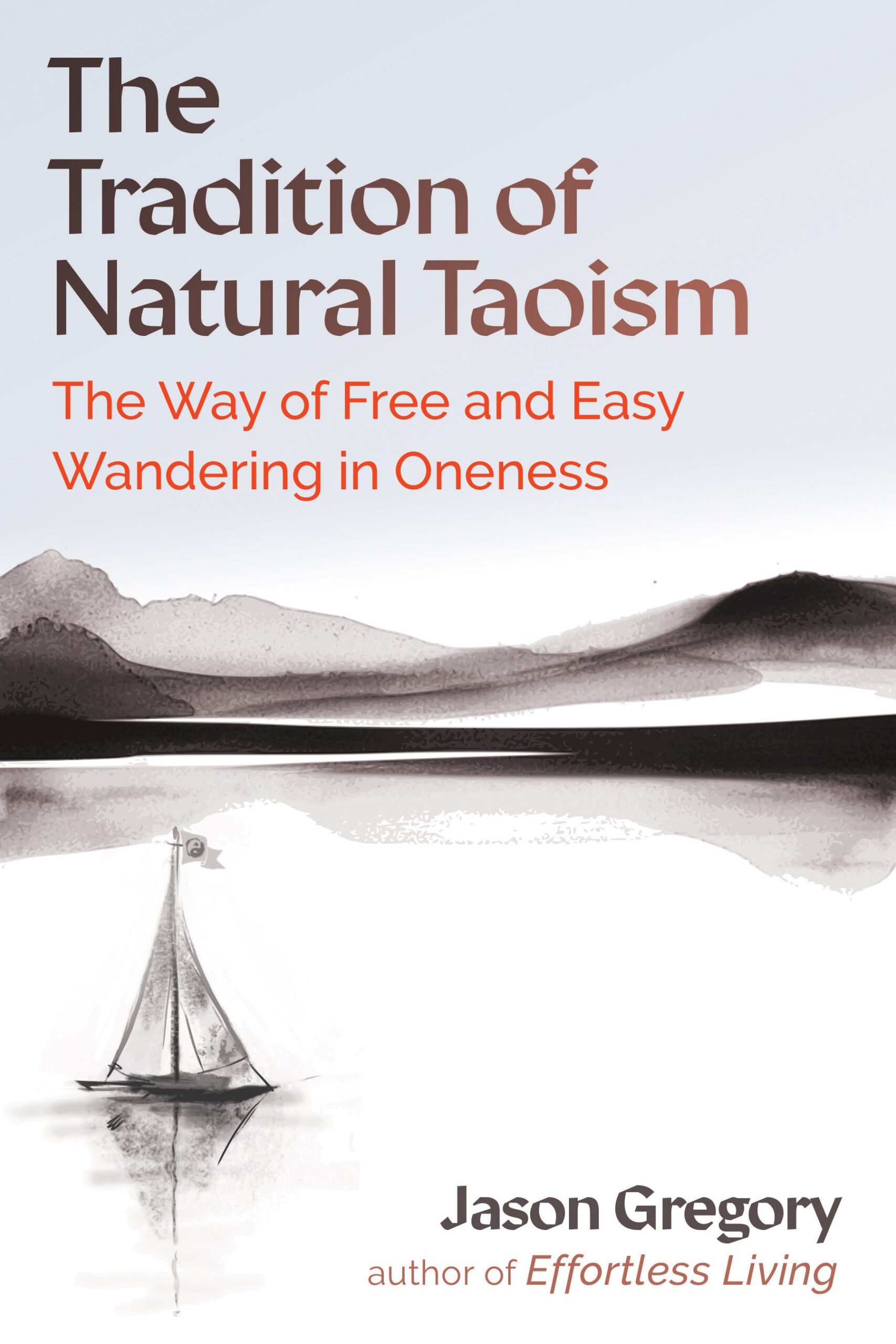History of the Monarchical View | Book Excerpt from Enlightenment Now
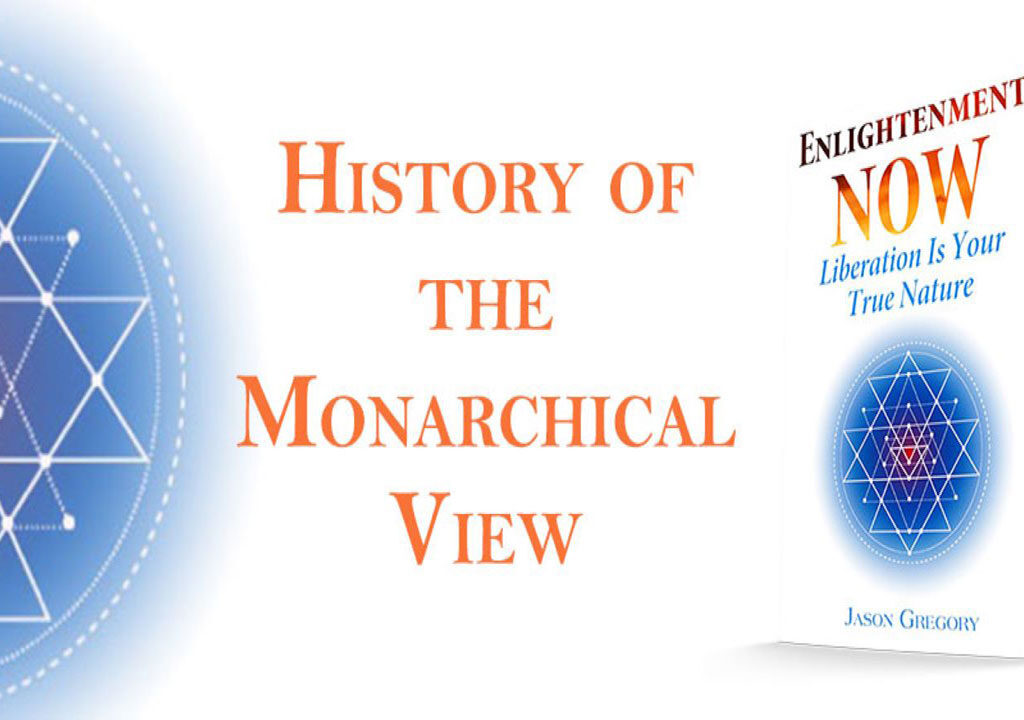
History of the Monarchical View | Book Excerpt from Enlightenment Now Tracing our history back to pre-agrarian culture, humanity was a people living in and with nature. We existed in small tribal and shamanic communities taking only the necessities of life, rather than whatever we wanted. Those archaic cultures did not have to seek equilibrium with the environment because they were already naturally harmonious. They perceived nature in all of its glory, as an extension of themselves, instead of our modern approach to nature as a separate and tyrannical lord. Material acquisitions were of no importance, as the welfare of the individual and the community were the main priorities. This is not to say that these cultures were above individual and collective folly, but the stark difference to our modern civilization is that their faults were generally addressed with an attempt to heal any problem through a consensus of opinion in a communal setting. An individual’s problem was the community’s problem and vice versa. The welfare of one was the welfare of all. In such a model, there is no individual above the others who decides what is good for the people. Even the rise of the shaman and holy person did not threaten this communal importance within tribal cultures. The shaman and holy person, though, is respected as the one who has done the internal work to possess the innate wisdom that heals others’ physical and psychological ailments. This is not to say that a shaman or a holy person necessarily held a position of authority over the community. On the contrary, in most cases the shaman and holy person was a hunter and gatherer just like anyone else, but differed in having a keen interest in medicine and healing, in much the same way that certain women of the community had a keen interest in arts and crafts. In this statement we are not suggesting that only men were shamans or holy people and that only women were interested in arts and crafts; that would be a common mistaken assumption. Within many tribal communities in ancient times the shaman and holy person, either female or male, held a place of equal importance to other members of the tribe, which is hard for us to fathom in our current era from a state of consciousness that tends to perceive reality in the mold of layers and levels of hierarchy. There were tribes in ancient times that did kill and shun shamans or holy people as outsiders. But in many cases tribal communities were based on the natural philosophy of mutuality as opposed to the modern view of individuality because individuality had not blossomed as it has in our current era. Tribal cultures are traditionally a partnership society based on mutuality and anyone in those ancient times who sought individual salvation from the group ran the risk of nature’s wrath. Those who were not mutually in sync with the other people of the tribe were viewed to disturb its harmony. Individuality, then, in those times was about how one benefited the group. Everybody had their place within the community by following what their natural God-given talents were. No one had to be assigned duties, as there was no one in the role of a dictator in the community assigning duties to others. In the Taoist philosophy of China, each and every individual has his or her own unique psychosomatic pattern that they express either physically or psychologically, which ultimately brings harmony to the world. In Chinese this unique organic pattern is known as li (理), and by following your li you naturally harmonize with the universal essence and order, Tao (道), which brings harmonic resonance into the world of form, known as ying (應) in Chinese. The ancient Taoist sages understood the natural tribal values brought down from living with nature and then into agrarian society. Invariably our li, in other words, our intrinsic human nature, is linked to art, because art in its purest form is the self-expression of one’s organic pattern. Because of this, the artistic path calls to the artist, and is not the result of personal desires and perceived pleasures. Pursuing your personal desires and pleasures within the apparently secure confines of your own physical and psychological comfort zones is no way to discover your organic pattern or freedom. This vain pursuit actually has more in common with a prison than anything else. That calling which naturally dawns upon our mind is the path of the hero, if we choose not to be distracted by what our egotistical mind is attracted to, because the ego is invariably associated to the hypnosis of laziness and procrastination. Mythologist and philosopher Joseph Campbell beautifully called following this calling “the Hero’s Journey.” He adeptly explained that if you discover your li and follow it—“following your bliss” in Campbell’s terminology—then you not only continually grow along the path of life, but you also change the world through your self-expression as it harmonizes with everything in reality, that is, ying. For example, artists often have the ying ability to bring people together, move them emotionally, and inspire others. Ironically, though, a lot of people strive to become an artist for fame or to appease their own intellectual pursuits and in both cases they usually fall short of the mark. On the other hand, successful artists in a lot of cases never intended to be famous and weren’t originally passionate about their craft, but from following the intuitive calling of li along the hero’s journey they continue to grow and become extremely passionate without any intention to do so at the outset. Establishing harmony between the individual and the community was common etiquette among many ancient natural tribal cultures. The community was an extension of the individual and so the individual is the community. The inner life of the individual becomes the culture. The microcosm and macrocosm are both one
The Way of the Warrior and Path of the Sage | Book Excerpt from The Science and Practice of Humility
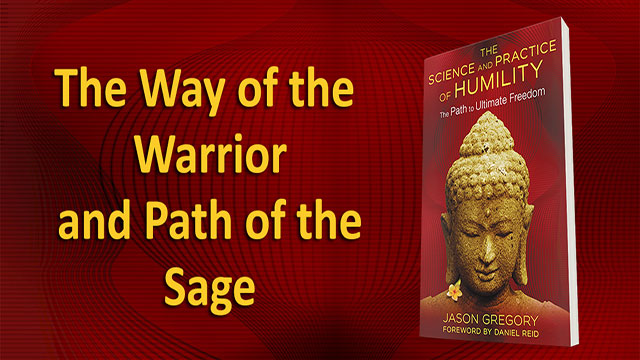
The Way of the Warrior and Path of the Sage | Book Excerpt from The Science and Practice of Humility A human has two primary states of awareness or modes of being. As we have mentioned there are those who are drawn into the daily dramas of life and those who have an elevated perspective, capable of seeing a fractal harmony within all life. These two states of awareness run parallel with the conscious state of the false ego and the true self, respectively. The ego perceives the fine details of reality. Like a microscope the ego focuses on the very tiny matters of life, then mistakenly builds its psychology around these insignificant situations. On the other hand the true self is the state of consciousness so pure that it constantly sees that life is pattern; in this state the unfolding universe can be visualized. This state of awareness is a mind of no deliberation, a mind that does not attach itself to any circumstance or thought—past, present, or future. The true self dwells within the spiritual plane and knows the soul vibrations, hence the evolution of perception. We associate this state of consciousness with a teacher of eternity or a sage, and the state of consciousness of the ego caught in the details with the masses or the profane. Both primary states of awareness are built into the universal structure. These two viewpoints have been an area of confusion throughout the ages. Yet both are necessary and together form a cosmic law. The teacher and student relationship is found in all levels of life, whether as parent and child, teacher and student, or— the most mysterious of all—master and disciple. In the immutable relationship between master and disciple, the disciple is still deluded by the mind, whereas the master knows the totality of our being. These two modes are represented in ancient scriptures and mystical stories as “the warrior” and “the sage.” Many examples of a sage teaching a warrior are found in the Vedantic treatises of India, most notably the Bhagavad Gita and Ribhu Gita (Song of Ribhu). The Bhagavad Gita tells the story of Arjuna the warrior and Krishna the sage, while the Ribhu Gita refers to Nidagha the warrior and Ribhu the sage. In both classics the warrior is suffering from his own mind and plight within this world. As he begins to question his mind, the guidance of the sage appears. In both scriptures the whole process is to lift the warrior’s mode of perception out of the details of life into the vision of the Divine. In the Bhagavad Gita Krishna attempts to move Arjuna’s awareness out of the daily mundane struggles of life into the vision of Brahman, which is to see the infinite in all things. Verses 31, 32, and 33 of chapter 13 of the Bhagavad Gita state: When a sensible man ceases to see differentidentities due to different material bodies andhe sees how beings are expanded everywhere,he attains to the Brahman conception. Those with the vision of eternity can seethat the imperishable soul is transcendental,eternal, and beyond the modes of nature.Despite contact with the material body,O Arjuna, the soul neither does anything noris entangled. The sky, due to its subtle nature, does not mixwith anything, although it is all-pervading.Similarly, the soul situated in Brahman visiondoes not mix with the body, though situated inthat body.1 This is only one of many ways to interpret these scriptures, but this way of understanding the relationship between the warrior and sage is imperative to the practice of the science of humility. These two modes of being correspond to the flow of chaos (warrior) and order (sage) within consciousness. One of the biggest problems to plague this planet throughout time has been the fostering of the warrior’s consciousness and the continual suppression of the sage’s consciousness. It comes back to the individual, so there is no one to blame for this other than ourselves. Our obstinate refusal to look within ourselves to find the true problems in our world has allowed us to further justify our own habitual ways that are slowly killing the human species. For us to ward off this fate, we need to understand where our awareness is rooted. To do this we need to explore the characteristics of a warrior and a sage. THE WARRIOR The warrior is an ephemeral state of awareness that gets swept up in trying to change the world. To achieve this implied change, warriors attempt to impose their will on others. In the belief they are striving for world peace, they cause more trauma. The warrior does not know that fighting for a solution only increases a problem. Why do we fight? Here “fight,” means to have conflict or oppose some situation either within or without. One of the major dilemmas of the human psyche is having the notion that something is either good or bad. When an individual judges if something is good or bad, it comes back to the false psychological state known as the ego: humans judge if something is good or bad according to their own conditioning from birth. Not being conscious of this, warriors seek to change the world according to their likes and dislikes. So a warrior does not truly want to bring peace to the world because he is in fact conspiring against it. The majority of beings on Earth have a warrior’s consciousness, which is evident in the chaos of the physical and mental worlds. Those who believe that what is right for them is the way for everybody else are not truly concerned about another being’s authentic way of life. A warrior harbors an artificial internal conspiracy, that of believing that we are our thoughts and our accumulated conditioning. Buying into the grand delusion of conditioning fragments reality into chaos and separation. The warrior knows the chattering within the mind but is ignorant of
Books for Studying Taoism
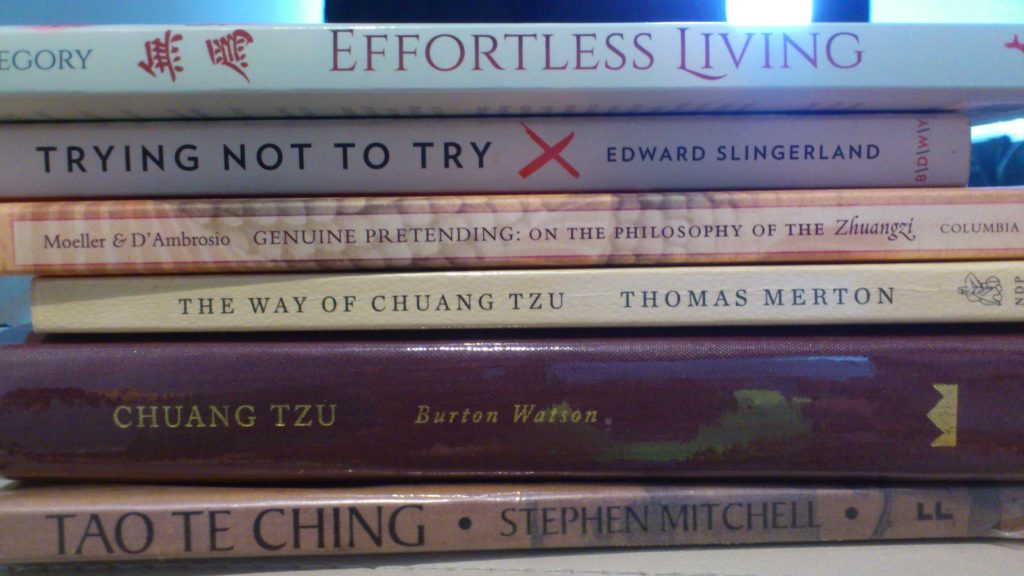
Books for Studying Taoism Taoism is a path often confused with being a conventional religion and primarily a form of spiritual cultivation concerned with martial arts and other Taoist arts. This is not completely untrue but its not the entire picture. All forms of Taoist spiritual cultivation and the religion are all based on its original philosophy going back 2,500 years to Lao-tzu and the Tao Te Ching. The problem with many modern spiritual movements is they have lost touch with the original philosophy of what they seek to practice and understand, modern watered down yoga is a good example. The Western version of yoga is just not yoga (watch my episode of Enlightenment Today on Yoga and the Eight Limbs of Yoga to understand the tradition). And this temperament is rife within those interested in Taoism. If you are not schooling yourself in the philosophy, or learning it in unison with your practice, then your practice will be handicapped. A human mind learns anything thoroughly when a framework for understanding has been studied. In regards to the Eastern spiritual traditions, it is best to study the philosophical framework from top to bottom so that your practice means something much deeper, so you can understand the intense process you are going through. Being absorbed in a spiritual process means we are in turn cultivating intelligence along the way. So it is not enough to go to a Taoist arts course, or your local yoga group, if we are just going to hang out with like minds and get distracted with mindless chit chat, turning the practice into a purely physical exercise or form of spiritual materialism. You have to throw yourself in the fire if you are serious about deep transformation. This means a lifetime of study when it comes to the spiritual traditions of the East. Though this shouldn’t be thought of as drudgery, but instead, it is an ever expanding joy you feel in your heart as those rich Eastern traditions will begin you to crack open your mind so it can blossom like a lotus flower. And to allow this transformation to bloom we need the right books to study. But I can tell you there are a number of books out there posing to be Taoist literature and then there are those that are authentic and sadly usually they’re the ones less read. To get a deep grasp of Taoism it is important to understand it in relation to the other great philosophies of the Warring States period of China. To understand the mind of Lao-tzu it is important to understand that period of time and the other sages that shared that time with him (if he did exist). One of the best books to understand the basis of Chinese thought is the Readings of Classical Chinese Philosophy by Philip J. Ivanhoe and Bryan W. Van Norden. Both Ivanhoe and Van Norden are esteemed scholars in the field of Chinese thought and have dedicated their lives to the study of its philosophy. This book includes all the classic texts of Chinese thought, including the works of Lao-tzu, Confucius, Mencius, Chuang-tzu, and more. This book is not just a great start but a great source book going forward. Even though Ivanhoe and Van Norden cover the classics in their anthology, it is good to get the classics on their own and some different translations to see some different scholarly perspectives. The Tao Te Ching is obviously imperative if you want to understand Taoism. There are a host of translations out there, some are authentic and some try to modernize the text. The second classic to study is the Chuang-tzu text. Some of the stories within the Chuang-tzu are something we could read in an afternoon but contemplate for a lifetime. He especially articulates the Taoist view of impartiality and mutuality as opposed to a mundane belief in good and bad, right and wrong, a righteous sense of morality, and a rationality that disembodies our mind and body. In my personal collection I own the Burton Watson translation which I love, but there are many great translations out there. A third classic to consider, though not considered traditionally Taoist, is the Mencius text by Mencius. Mencius is a Confucian but many scholars, and even myself, believe that much of his philosophy is Taoist rather than Confucian. To learn more about Mencius its best to watch my episode of Enlightenment Today on Mencius. On top of reading all the classics, there are a host of great contemporary scholars and teachers who explore Taoist thought very deeply. Philip J. Ivanhoe and Bryan W. Van Norden, who I mentioned earlier, have a host of great books exploring Chinese thought. Both have translated some of the classics, including the Tao Te Ching and the Mencius. Another scholar you need to know is Hans-Georg Moeller. Moeller has significantly shaped the way I think about Taoism. His recent classic Genuine Pretending,co-authored with Paul J. D’Ambrosio, is a must have in your library, especially if you want to understand the mind of Chuang-tzu. Moeller’s other books, such as The Philosophy of the Daodejing, Daoism Explained, and his translation of the Tao Te Ching are must reads. Edward Slingerland is another scholar you need to know. Slingerland has done a great job popularizing Chinese thought through his book Trying Not to Try. This book is a great exploration of wu-wei from the differing perspectives of the great sages from the Warring States period. But even though this book was for more of a mainstream audience, it still has great depth and is not just for beginners. Slingerland also has another great book on wu-wei called Effortless Action which is far more academic but that is precisely why it is a deep read. Personally I was introduced to Taoism through the philosophy and not the practices of Taoist arts,
Effortless Living OUT NOW!
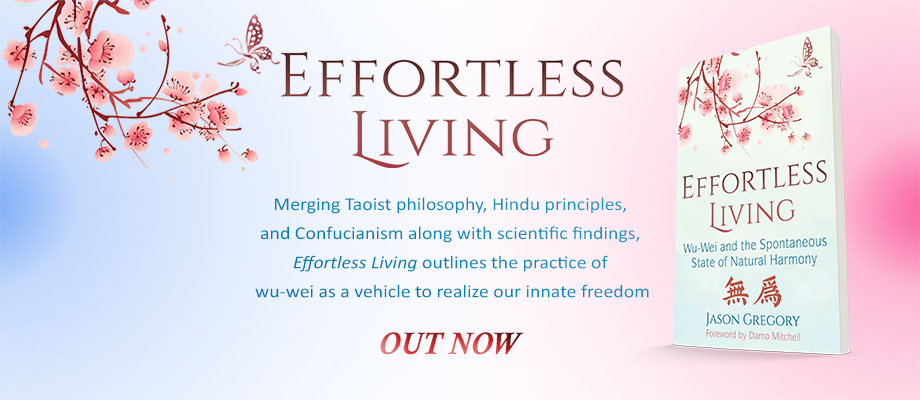
Effortless Living is out now (published March 13, 2018). I’m excited for everyone to read it and hopefully it will inspire people to look deeply and seriously into the ancient teachings of wu-wei as explained by Lao-tzu. This book had a natural gestation period which was much longer than my previous books and ironically (or synchronistically) mimics some of the natural Taoist philosophy and wisdom I share in the book. Some of the key elements of the book are: • A guide for achieving an enlightened mind through the art of non-doing • Details meditation practices, focused on stillness of the mind, along with Patanjali’s yoga methods to maintain a consciousness referred to as “being in the zone” • Builds on Taoist, Confucian, and Hindu principles along with scientific findings to support wu-wei–the art of non-doing, non-forcing–as a way of life • Explains how wu-wei practitioners cultivate intelligent spontaneity and effortless action to allow the natural harmony of the cosmos to prevail Effortless Living is available in all book stores and also online. Explore the links below to discover all the publication deals available: Amazon Paperback http://amzn.to/2z0EG3Q Amazon Kindle http://amzn.to/2kat381 Inner Traditions https://www.innertraditions.com/effortless-living.html Trusting life and allowing life to be as it will without our conscious interference is the wisdom Lao-tzu brought forth which is still alive today. This wisdom is more relevant now than ever. Not only is this wisdom practical and sane, but it is also an antidote to a world that has got itself in a big rush, become so opinionated, and misinformed on the nature of life. Effortless Living is the way forward into peace and sanity for all.
The Skill of Martial Arts is Yin Over Yang | Book Excerpt from Effortless Living
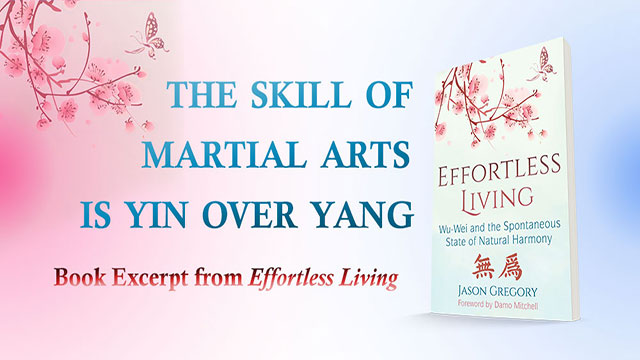
The Skill of Martial Arts is Yin Over Yang | Book Excerpt from Effortless Living The science and practice of martial arts are based to some degree on the science of traditional Chinese medicine (TCM). This is evident in the fact that TCM focuses on how our body is a miniature inner universe. When we know and understand this inner universe, we begin to know the greater, outer universe and see how both function the same. Martial arts make use of this idea through movement methods that are supposed to open up the meridian channels of the body. This allows qi to flow freely, so that the mind and body are in harmony with the effortlessness of the heavens. This experiential knowledge attained by martial artists is supposed to transfer over into daily life, as it did with Thor Heyerdahl. Trust, then, is at the heart of martial arts, as they are based on the fundamental Taoist philosophy of wu-wei. The problem with martial arts is, as I have mentioned, that they have been infected with the cultural tendency toward doing, which becomes an intellectual game of striving for a so-called goal. Our whole world is invested in the energy of yang at the expense of yin. Our modern habits of doing, control, and force are deeply entrenched in both spiritually oriented and combat-oriented martial arts. And yet the core of both methods is the same, as martial arts are about transforming your character to reveal your true nature. This is the spiritual heart of martial arts, but it has been misinterpreted by Westerners and also by numerous people in the East. Many people think that the spiritual transformation in martial arts is about attaining powers or experiencing some altered state of consciousness similar to a psychedelic experience. This way of thinking is the “amateur spirituality” to which Chuang-tzu alluded. Amateur spirituality is the attraction to peacock consciousness, meaning that people still have the yang habit of showing off or telling other people about how peaceful and lucid their state of mind is. The irony of peacock consciousness is you find these people always talking about themselves, to the point where the listener feels ill and exhausted. This is especially true for those people trying to attain supernatural powers, called siddhis in Sanskrit. Such proclamations prove that no real transformation has occurred. All that has occurred is that one has become a well-trained show pony. This show-pony attitude is yang-oriented and has nothing to do with the basis of martial arts. As a result martial arts in the modern world are based on the perpetual activity of yang and failing to embrace the nondoing of yin. We discover this yang-over-yin temperament in the sport of mixed martial arts (MMA), which is best-known through the organization of the Ultimate Fighting Championship (UFC). The athletes of MMA are well-trained; many of them function at a rate of peak performance, which can be quite a spectacle to watch. But the problem is that many mixed martial artists and spectators believe martial arts are about talking trash and beating the hell out of the opponent. Though this may be entertaining for the spectator, we should not delude ourselves into thinking this has anything to do with martial arts. Rather it is just martial arts on steroids, polluted with the idea of yang over yin, doing over non-doing. This attitude inclines one toward competition because of its innate characteristics of force and control. If mixed martial artists, or any combat sport athletes, for that matter, were serious about martial arts, they would need to understand and embrace the essential tenet of cooperation. Cooperation in martial arts is evident in the internal practice of pushing hands, known as tui shou in Chinese. In the practice of pushing hands, each person is feeling and moving according to the energy of the opposing person. Pushing hands works to undo our natural instinct to resist force with force by teaching the body to yield to force and redirect it. Force does not exist in this practice, because in feeling and moving according to the energy of the other person, we are accessing our receptive yin nature. Yin evokes the art of cooperation. Although it may appear that pushing hands is a form of competition, it instead is a dance, as you essentially need two to tango. Even so, pushing hands, like many other aspects of martial arts, has succumbed to the tendency toward the yang characteristics of competition and peacock consciousness. In both spiritually oriented and combat-oriented martial arts and MMA, the yin art of cooperation is at the core of all forms of cultivation. For example, if a mixed martial artist is trained properly, he or she will know that there is no opponent other than himself or herself. You are essentially testing yourself against your so-called opponent. The only opponent is yourself, and your perceived opponent is a mirror of where you are in your training. The mirror of the opponent reflects back to you your spiritual development as well as aspects of your character that have not been transformed or cleansed out of your psyche. So no matter what form of martial arts we are talking about—including MMA—the essential heart of the art is to blunt your sharpness. Blunting the sharpness is a phrase used by Lao-tzu in the Tao Te Ching to describe the softening of one’s rigid personality. In martial arts, it is about evoking the yin qualities of humility, compassion, forgiveness, respect, and honor. For thousands of years, martial arts have been mistakenly seen as practices to cultivate the yang, masculine characteristics of power, force, and control. This incorrect perspective has only increased our tendencies toward competition and trying to stand out in the crowd. Martial arts are not based on yang over yin but on yin over yang. They are a practice that mimics life, as the majority of
Harmony of Nonconformity | Book Excerpt from Effortless Living
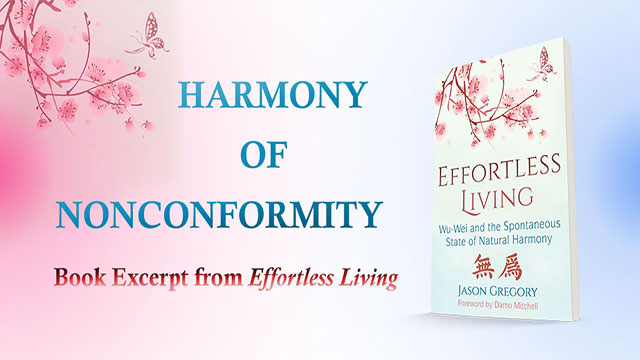
Harmony of Nonconformity | Book Excerpt from Effortless Living In a linear world, the external order dictates an artificial way of life to the individual, creating a conformist society and forcing us to relinquish our power to a machine that is unnatural and devoid of life. This passive conformity can be traced back to the origins of the Vedic Hindu caste system and the feudal system under medieval Western Christianity. When a settled agrarian culture such as these is born, it tends to build towns, not only to protect people from outside influences, but also to develop a mental framework based on rules and regulations. The complexity of agrarian culture leads to a division of labor and a division of function. From this division, the ancient Hindus (the Vedic civilization of Dravidians and Aryans) developed a caste system. The Hindu caste system is made up of the Brahmins (priesthood), Kshatriyas (nobility), Vaishyas (merchants and farmers), and the Shudras (laborers). A direct parallel to the Hindu caste system can be found in medieval Christian society, where we see the priesthood and the church, feudal lords and nobility, farmers and merchants of the commons, and the serfs. Although we no longer have a caste system, this underlying pattern is still with us today. When we are born into this world, we come out of our mother’s womb (nature) and are taught to submit to the rules of society and culture according to our socioeconomic status. This is the crucifixion of the individual; it is the sacrifice we all make. According to the tyranny of the machine, this crucifixion is for the “common good” or “greater good.” But there is a stark difference between the Hindu and Christian societies of ancient times. First of all, the function of the Vedic caste system was an act of surrender to Brahman (ultimate reality/godhead). Individuals would crucify their egos and their desires in favor of the lives they had been given by nature. This means they would not seek another path or to try and control their lives according to their interests. Instead they would abide by the order of society, which helped them diminish their egos so that they could feel the presence of Brahman within themselves. This is dharma as social duty. The second difference is that, once Hindus have fulfilled their social duties in this life, they are allowed to break away from caste and become renunciate sages in the forest, a practice and title known as vanaprastha in Sanskrit. (This possibility is loathed by Christian society, because one is thought of as useless if one does not contribute to the social order.) This breakaway from caste is viewed as a return back to nature and could be thought of as a resurrection. A sage is not part of society and does not conform to its rule. Jesus was a sage in this mold. This is why he was not thought of as a particularly good member of society and he was actually put to death (if we take the story of Jesus to be real). Those who submit invariably lose their natural innocence. Conformity is the result of force. When individuals are forced by society and culture into life situations that are against their will, they give away their natural sovereignty in exchange for comfort and servitude and are psychologically reduced to sheep. We have developed this sheeplike behavior as a result of the belief that the morals and ethics forced upon us by society are avenues to success and freedom. But this notion is absurd inasmuch as the success and freedom of our world are unnatural. These goals are gauged only by finances. But obviously this is not true success or freedom, as money is empty and void of meaning, and it provides no happiness other than that of acquisition. Happiness cannot be contained in anything that we need to force to happen. As human life is forced into a sheeplike way of being, happiness is reduced to momentary stimulants of excitement. In such a life we can never express our natural divinity, li, because we are following the model of someone else’s idea of life. Yet conforming to anything other than one’s own innate world destroys us physically, mentally, and spiritually, as te, the virtue of Tao, cannot come through the organic pattern of the individual, li. Anxiety, depression, and stress are so prevalent in this day and age partly because we are forced to live such lives. Wars and social unrest then reflect the individual’s anxiety. Liberated individuals are in alignment with their own nature and with the Tao. They do not benefit the accepted social order and are regarded as useless in the eyes of institutional and organizational power. Lao-tzu and Chuang-tzu were treated this way, because they could see the unnaturalness of an artificial society. The Buddha and Jesus of Nazareth were two other such sages who could see through the hypnotic veil. A liberated sage understands that anyone who continues to act out the unnatural patterns of conditioning is contributing to chaos and destruction, either consciously or unconsciously. One who is liberated, on the other hand, begins the yoking process until a crystal-clear perception of the Tao in reality can be experienced. In Richard Wilhelm’s translation of the I Ching, he states: Not every man has an obligation to mingle in the affairs of the world. There are some who are developed to such a degree that they are justified in letting the world go its own way and in refusing to enter public life with a view of reforming it. But this does not imply a right to remain idle or to sit back and merely criticize. Such withdrawal is justified only when we strive to realize in ourselves the higher aims of mankind. For although the sage remains distant from the turmoil of daily life, he creates incomparable human
Books for Studying Vedanta
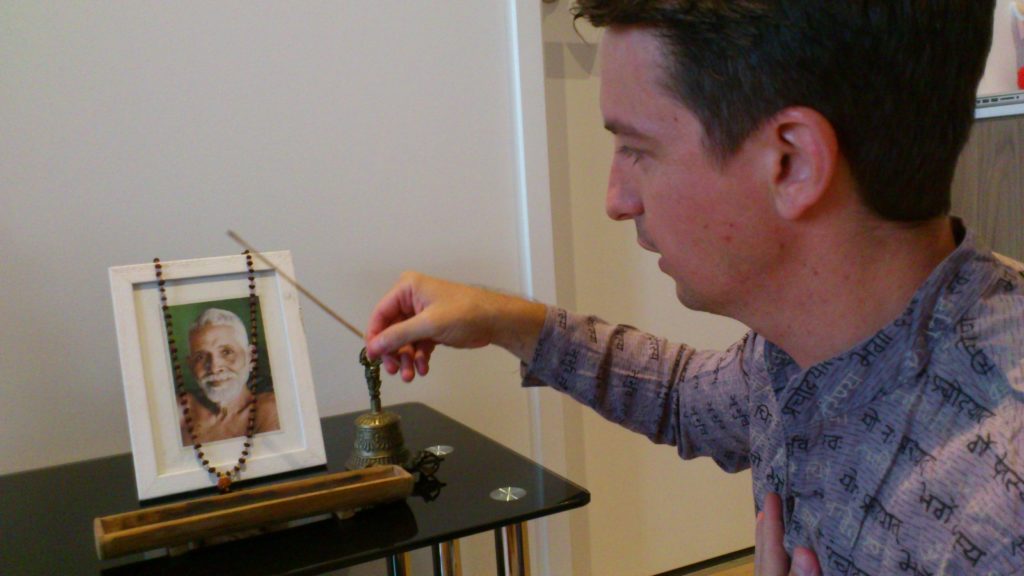
Books for Studying Vedanta I’m often asked what someone should do if they want to study Vedanta. My response to this question is like any other question, its not that black and white. People argue all day whether one should have a teacher, read the classics, or stop reading altogether. Again, there is no one method that fits all. But what I will say is if you want to dive deep into Vedanta then its important to study the classics since those classics are the foundation the tradition is built on. If you haven’t studied the classics then your mind will have a tendency to lose its way in your practice which leads people into all sorts of psychological problems such as spiritual bypassing. Even though, from the Vedic perspective we are not fundamentally the contents of our mind, those skilled adepts from thousands of years ago understood that our mind needs a framework for understanding anything to its nth degree. Our intellect can help us understand deeper concepts which unravels the mind and can have the potential to ultimately unravel the intellect. And when we speak about Vedanta we are speaking about the deepest spiritual concepts known to the human race (only other Eastern traditions compare to Vedanta such as Buddhism and Taoism). What teachers of Vedanta explain is its ancient wisdom is not learned knowledge but instead realized knowledge from great adepts. Whether you believe in those sorts of statements is up to you, but what we cannot deny is the science of mind and universe they realized (or created) rings true once we understand the philosophical framework. And this philosophical framework has got a bad rap from modern New Age teachers who ignorantly tell people to stop reading as if it is evil (but the truth might be they can’t really grasp the depth of Vedanta so they feel obliged to ridicule the classics). As a result, we have this growing trend of unintelligent spiritual seekers who follow a New Age “guru” with no discernment in a sycophantic manner. This type of “spirituality” is not really spirituality and gives it a bad name in the same way that evangelists give Christianity a terrible reputation. For this type of hypnosis and airy fairy woo-woo attitude to cease we have to become sincere in studying the classics as if our life depends on it, especially in Vedanta, let alone any Eastern philosophy. This is why in regards to spirituality tradition trumps New Age thought. And I can personally tell you that when you learn the tradition completely there is truly something about it that is hard to explain (this goes for any Eastern philosophy). Maybe its that ancient quality, as the tradition came from an ancient civilization of people dedicated to Sanatana Dharma (eternal tradition or way/Hinduism) and delivered a science that is still at the spiritual summit today. Reading the classics, then, does matter. They will benefit your practice going forward. Where to start you ask? Well you have to start with what Vedanta is based on, the Prasthanatrayi. This Sanskrit word refers to the three texts that make up Vedanta: the Upanishads, the Bhagavad Gita, and the Brahma Sutras. These three texts are what Vedanta is based on, so it would be absurd to not study these texts. Also, keep in mind, that there are three major branches of Vedanta which include Advaita (non-dualism), Vishishtadavaita (qualified non-dualism), and Dvaita (dualism). (Watch my episode of Enlightenment Today on Advaita Vedanta to know more). Which path you’re drawn to will depend on your temperament. But what is universal among all three schools is the study of the Prasthanatrayi. Now I can tell you there are a host of translations, and I’ve read quite a few, but I’d say do your homework before you jump in and purchase one. In relation to understanding Vedanta there is an extraordinary amount of books, too many for me to mention. But I will mention a few that will benefit your understanding of Vedanta. Vivekachudamani (Crest Jewel of Discrimination) by Shankara are a bunch of poems on Avaita Vedanta philosophy that are important to study. Alongside Shankara’s work, there are two Gita’s worth reading that dive into Vedanta, they are the Song of the Avadhut and the Song of Ribhu. Both texts are popular in the state of Tamil Nadu in India and are more focused on Advaita. They constantly point us back to the nondual source of our existence. Sticking with Advaita, I recommend reading Be as You Are by Sri Ramana Maharshi and I Am That by Sri Nisargadatta Maharaj, both of whom are regarded as two great Advaita Vedanta gurus from the 20th century. Another book is Sanatana Dharma by Sri Dharma Pravartaka Acharya. This book is about the eternal way (or dharma and culture) known in Sanskrit as Sanatana Dharma which we call Hinduism today. Sri Dharma Pravartaka Acharya follows the school of Vishishtadvaita and this book is a thorough study of Sanatana Dharma. Another great book is from modern Advaita Vedanta teacher James Swartz. His book The Essence of Enlightenment is a fantastic exploration of Vedanta from a man who follows the tradition honestly. Last, but not least, is a book written by Alan Watts called The Book. This special little book is an interesting look at Vedanta from the mind of a philosopher who was touched by the tradition. There are other books I could mention, like basically any book by Joseph Campbell or books by Huston Smith and Aldous Huxley, but there are just too many. I feel the books I have mentioned are enough for you to clear the mind and build a new framework in your mind from the ground up that has the potential to touch what Vedanta promises: the recognition of the Eternal Brahman as your true nature. SHARE
Lao-tzu on Desires
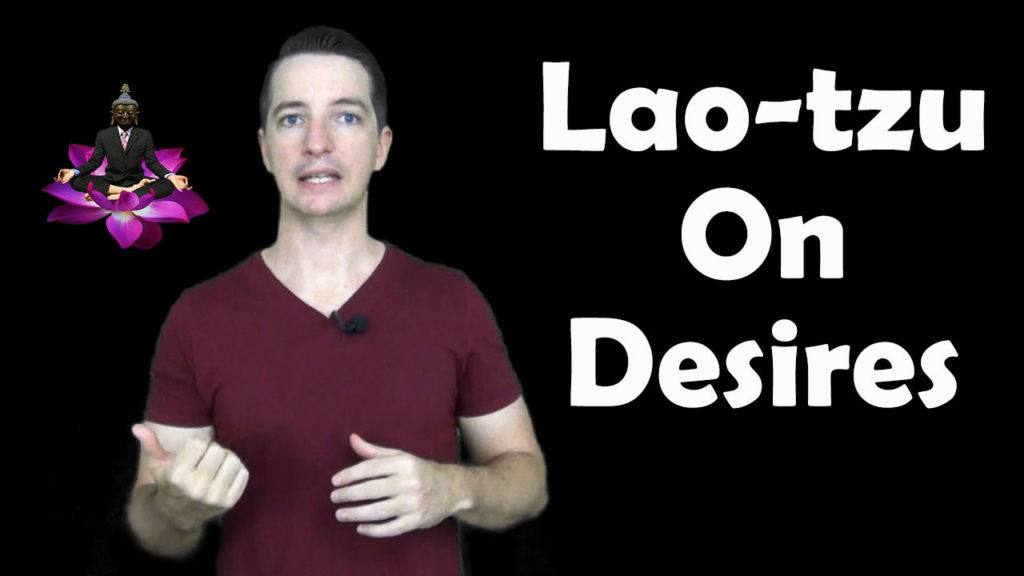
In this episode Enlightenment Today we will explore the desires of the eye and the desires of the belly that Lao-tzu mentions in the Tao Te Ching. The desires of the eye are the artificial needs created by society, which keep up chasing and hunting a life that is not ours and this in turn maddens our hearts, to use Lao-tzu’s words. These desires are insatiable and practically infinite. The desires of the belly are our basic needs, which are very simple. These desires of the belly are what nature gave you and they are quite modest needs. If our natural needs are quite modest than our starting off point to be a sane and healthy individual is oriented in the wrong direction. But if we reorient our lives towards the desires of the belly we will realize that human beings have a simple nature and are easily satisfied. We only mess with this simple nature when society creates artificial desires and as a result we want more than we naturally need. Recommended Reading Readings in Classical Chinese Philosophy http://amzn.to/2EgVpTN Tao Te Ching (Gia-Fu Feng & Jane English translation) http://amzn.to/2z6w7V3 Tao Te Ching (Philip J. Ivanhoe translation) http://amzn.to/2iCs0tU Tao Te Ching (Stephen Mitchell translation) http://amzn.to/2hPV6IX I Ching http://amzn.to/2zWMSW7 Trying Not to Try http://amzn.to/2z6l0eU Tao: The Watercourse Way http://amzn.to/2zZGn2N
My Top 5 Books of 2017
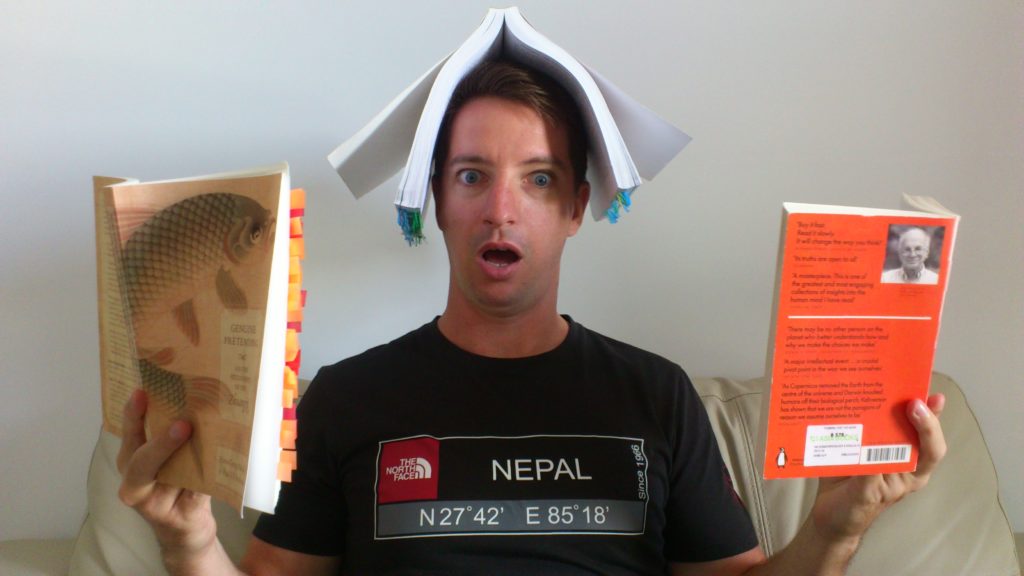
My Top 5 Books of 2017 2017 was a rich year for books on spirituality, philosophy, psychology, and optimal performance. Too many to get through. But if you use your time wisely then there is more than enough time to at least consume and digest five books a year. I use to set lofty goals of always reading ten books a year, but as a writer that is not possible with my commitment to my work. But its still a target I aspire to reach every year because, even if you hit the 5-10 mark each year, it means you haven’t been wasting your time on things that don’t matter. Many of us these days waste most of our time on entertainment. We scour digital devices night and day for the next soundbite to entertain us. Reading, on the other hand, puts the power back in your hands and it demonstrates a loud and clear NO to becoming a distraction junkie. Reading the right books will build the foundational pillars in your life (or in your mind) to cultivate intelligence, harness creativity, and experience prolonged equanimity. Below are the best books I read in 2017 (not all are published in 2017). Genuine Pretending: On the Philosophy of Zhuangziby Hans-Georg Moeller and Paul D’Ambrosio Chinese philosophy (alongside Indian philosophy) is always my central focus because of my dedication to to delivering ancient Eastern thought for modern minds. And when it comes to the ancient Daoist (Taoist) sage Zhuangzi (Chuang-tzu) I’ll read anything about his philosophy. When people speak about Daoism they often look to Laozi (Lao-tzu) for its gems. But if you have not encountered the genius of Zhuangzi then it is hard to get a complete picture of the depth of Daoism. As soon as I laid my eyes on Genuine Pretending it was immediately on my hit list. And I can tell you that Hans-Georg Moeller and Paul D’Ambrosio did not disappoint. They explain how the classic Zhuangzi text is not a one dimensional text. A lot of people believe the text is either a book on metaphysics, spirituality, strategy, or politics. But the authors believe it is all of the above and much more, especially when we take seriously (or not seriously) the humor component of the text. Genuine Pretending goes into the science behind humor and what that has to do with the spiritual depth of the Zhuangzi text. They have a thorough study of sincerity and authenticity, and how that relates to Confucian thought and Zhuangzi. This book explains that even though Zhuangzi is criticizing Confucian thought somewhat, he is really poking fun at it because of the sincere people we are supposed to become through high moral values and ideals that Confucius believes we should live up to. Zhuangzi skillfully knows these high rationalistic goals are not possible. Zhuangzi explains that in trying to create sincere people we actually create the opposite. Most importantly they introduce the Genuine Pretender, the joker in the pack, which in their opinion is a state of being Zhuangzi recommends for us to be in if we want to be a healthy and sane individual and live in a healthy and sane world. “A genuine pretender develops a capacity to playfully and skillfully enact social personae by looking at things, including oneself, from a ‘zero perspective.’” The Yoga Tradition: Its History, Literature, Philosophy and Practiceby Georg Feuerstein I’ve read a truckload of books on Yoga. Some have been done well and others struggle from a lack of understanding the philosophy of the great tradition. But there is no doubt that The Yoga Tradition is the best book on Yoga period. Georg Feuerstein is still one of the most underrated scholars on Yoga and Eastern thought out there. His understanding of classical Yoga is phenomenal. This book has often been referred to as the “Yoga phone book” for its size. But I will tell you this, you don’t want the book to end once you dive in deep. Feuerstein explores everything about the Yoga tradition to its nth degree. Actually, he covers a lot more than that. He also does a fantastic job in covering Vedanta and Samkhya philosophy. He takes you through the whole history of Hindu thought, not just Yoga. Be careful though, this book is the real deal. It is not about the Western version of Yoga that is a poor rip off of Hatha Yoga. This book explains what Yoga truly is and why it is important to follow the tradition and not its cheap imitations. As a writer, I find it inspiring to see the length Feuerstein went to produce a piece of work that will be around for hundreds, if not thousands of years. His scholarship is unmatched when it comes to Yoga. But it is his heart and wisdom that keep the fire of this rich tradition burning into the future. Thinking, Fast and Slowby Daniel Kahneman The relationship of psychology to spirituality, specifically Eastern thought, has been growing exponentially for decades. But I believe it is with the recent developments in cognitive science that a lot of explanations we are looking for in regards to spirituality and the nature of mind can be finally answered. My own work has also began to make the obvious connections between the Eastern philosophical traditions and cognitive science. You see this in two of my books, Fasting the Mind and Effortless Living, and also in a future unpublished book. And if you’re interested in understanding cognitive science thoroughly, then Kahneman’s Thinking, Fast and Slow is the perfect start, if not a complete picture thus far. Most importantly Kahneman thoroughly explains dual process theory, the two systems of cognition in our brain. These two systems are the key ingredient in understanding the workings of our mind and it is perfectly adapted to Eastern philosophy, which both make a complete science of mind. The Art of
Effortless Living Pre-order Free Giveaway
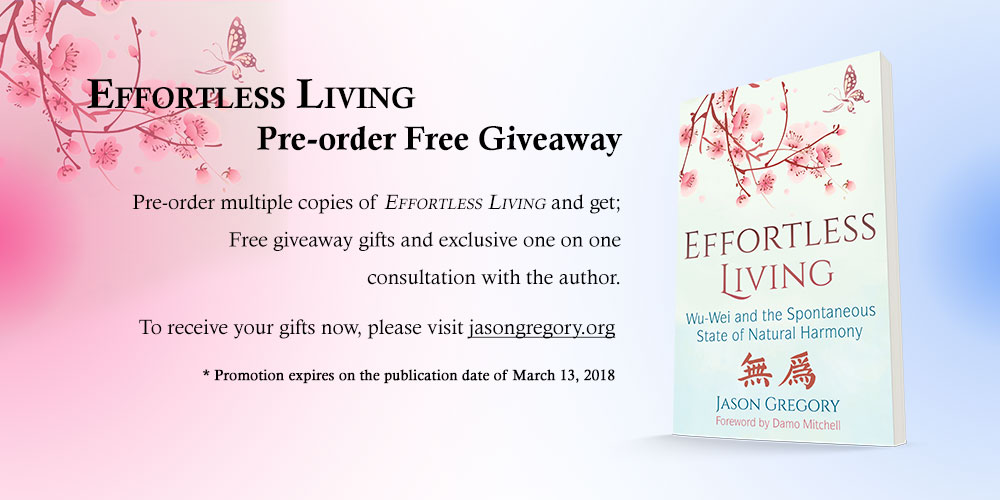
To celebrate the publication of my new book Effortless Living: Wu-Wei and the Spontaneous State of Natural Harmony this year Amazon and I will be holding outrageous deals on pre-ordering which will expire on the publication date of March 13, 2018. Amazon’s pre-order price guarantee will guarantee that you receive the lowest price from now until the book is published if you pre-order today. Also I will have four pre-order offers for you to choose from which all include a bunch of awesome stuff that you can share with others. These packages might be the perfect solution to a lot of headaches people have when trying to decide on gifts for others. Below you’ll see these four offers and bonuses for anyone who pre-orders the book now. If you believe there are people in your life that might benefit from or enjoy my new book then take advantage of this once off offer. MY OFFER TO YOU #1 – If you pre-order 5 copies of Effortless Living before March 13, you’ll receive: *A personally signed copy of my book Fasting the Mind delivered to your door. Click here to pre-order 5 copies, then email your receipt to jasongregory@hotmail.com.au with “Pre-order #1” in the subject. When you receive the books send a photo of you with the books to the above email or post it on my Facebook or Twitter and I will send your gift straight away (The photo is done just to make sure people actually receive the pre-orders and do not cancel their pre-order and receive my gift under false pretences). #2 – If you pre-order 10 copies of Effortless Living before March 13, you’ll receive: * A personally signed copy of my book Fasting the Mind delivered to your door. * A personally signed copy of my book Enlightenment Now delivered to your door. Click here to pre-order 10 copies, then email your receipt to jasongregory@hotmail.com.au with “Pre-order #2” in the subject. When you receive the books send a photo of you with the books to the above email or post it on my Facebook or Twitter and I will send your gift straight away (The photo is done just to make sure people actually receive the pre-orders and do not cancel their pre-order and receive my gift under false pretences). #3 – If you pre-order 20 copies of Effortless Living before March 13, you’ll receive: * A personally signed copy of my book Effortless Living delivered to your door. * A personally signed copy of my book Fasting the Mind delivered to your door. * A personally signed copy of my book Enlightenment Now delivered to your door. * A personally signed copy of my book The Science and Practice of Humility delivered to your door. *A 30 minute skype call with me to discuss my work and strategies that will help design a healthy lifestyle for you which will promote well-being, focus, mindfulness, and creativity that all contribute to authentic independency. This conversation is not set in stone and can be flexible based on your needs. Click here to pre-order 20 copies, then email your receipt to jasongregory@hotmail.com.au with “Pre-order #3” in the subject. When you receive the books send a photo of you with the books to the above email or post it on my Facebook or Twitter and I will send your gift straight away (The photo is done just to make sure people actually receive the pre-orders and do not cancel their pre-order and receive my gift under false pretences). #4- If you pre-order 50 copies of Effortless Living before March 13, you’ll receive: * 2 personally signed copies of my book Effortless Living delivered to your door * 2 personally signed copies of my book Fasting the Mind delivered to your door. * 2 personally signed copies of my book Enlightenment Now delivered to your door. * 2 personally signed copies of my book The Science and Practice of Humility delivered to your door. *A 1 hour skype call with me to discuss my work and strategies that will help design a healthy lifestyle for you which will promote well-being, focus, mindfulness, and creativity that all contribute to authentic independency. This conversation is not set in stone and can be flexible based on your needs. Click here to pre-order 50 copies, then email your receipt to jasongregory@hotmail.com.au with “Pre-order #4” in the subject. When you receive the books send a photo of you with the books to the above email or post it on my Facebook or Twitter and I will send your gift straight away (The photo is done just to make sure people actually receive the pre-orders and do not cancel their pre-order and receive my gift under false pretences). *This offer applies to digital or physical pre-orders. Thank you all for the support.
